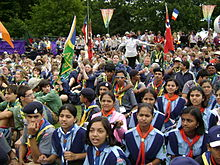If Scouting is about fulfilling your potential, then Robert Stephenson Smyth Baden-Powell (or B-P) certainly fulfilled his. B-P, or ‘Stephe’ as he was known as a child, was born in Paddington, London on February 22, 1857. He was the eighth of ten children of the Reverend Baden-Powell, a professor at Oxford University.
Inspired during the siege of the small South African township of Mafeking during the Boer War by the initiative shown by boys under pressure, Baden-Powell realised that young people had huge potential that was often left untapped. Already thinking of developing a training programme for young people in Britain, he was encouraged by friends to rewrite his handbook for soldiers (Aids to Scouting) for this younger audience.
Brownsea Island 1907
On 1 August 1907, 20 boys gathered to join the first experimental Scout camp on Brownsea Island, near Poole in Dorset. The man behind the event was Robert Baden-Powell, a soldier, artist, and writer. In bringing young people from different backgrounds together, he hoped to bridge gaps in society, and give everyone the opportunity to learn new skills. It was a radical idea at the time, but it paved the way for what was to come.
Scouting for Boys was published in 1908 in six fortnightly parts at 4d a copy. What had been intended as a training aid for existing organisations became the handbook of a new Movement, which secured the royal seal of approval the following year when King Edward VII agreed to the introduction of the King’s Scout Award.
Things take off
In its first census in 1910, Scouting had almost 108,000 participants; over 100,000 were young people. As the Movement spread across the world, Scouting continued to evolve in the United Kingdom, and has done ever since. From rebranding to The Scout Association in 1967 to renaming sections and updating uniforms, the quest to be a truly modern movement is ongoing. Perhaps the biggest step toward modernisation was the decision to allow girls to join the Venture Scout section; this was introduced to other sections in the early 1990s.
In the trueIspirit of an inclusive organisation, younger children got to experience Scouting for the first time with the official incorporation of the Beaver Scouts in 1986. Three years later, official headgear was abolished for all sections.
Scouting Today
At the dawn of the 21st Century, the Association again underwent reform with the launch of a new logo, uniform and training programme and the introduction of Explorer Scouts and the Scout Network by 2002.
In 2007, the Movement celebrated its centenary and the 21st World Scout Jamboree was held in the UK. Scouting hit the headlines in 2009 when TV adventurer Bear Grylls was announced as the new Chief Scout.
In 2020, the world was gripped by the devastating effects of the Coronavirus and face to face scouting had to cease. Recognising the importance of scouting to the welfare of children, the Scouting movement and individual groups carried on through virtual scouting, inviting members to continue to attend online and carry out activities that were ‘adapted’ to the current environment.

Founder’s Day
Baden-Powell is remembered on Founder’s Day – celebrated on his birthday 22 February each year. To this day Scouts continue to enjoy activities in the outdoors and live out his ideas. As the great man once said, ‘life without adventure would be deadly dull.’